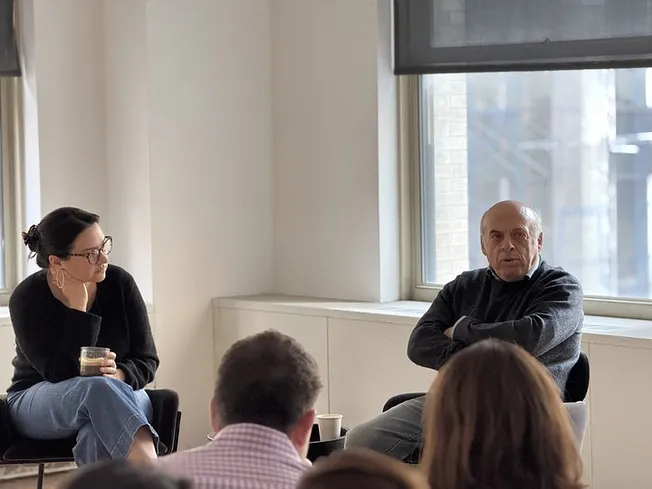Why were charges dropped against the Columbia rioters? Will the crypto bros break for Trump? Is national service a good idea? And Nellie Bowles asks: Are vapers no better than ‘little gerbils licking their water dispensers’? All that and more on today’s Front Page from The Free Press.
But first, our lead story. Catherine Herridge is among America’s most accomplished investigative reporters. She’s also among the most principled. When a judge recently ordered Catherine to divulge information about her sources, she refused, even though she now faces potentially crippling fines of $800 per day.
Writing for The Free Press today, Catherine explains why she refuses to back down—and lends her voice to the chorus calling on Congress to take action and pass legislation to protect a central principle of investigative journalism.
If confidential sources are not protected, investigative journalism will die.
I know that sounds overly dramatic, and I know you’ve probably heard it a million times. But it’s true. I’ve been a TV correspondent for three networks—Fox, CBS, and ABC—across four decades. I’ve broken my share of stories about government wrongdoing, and I know for a fact that if I hadn’t been able to offer my sources a credible pledge of confidentiality, they never would have divulged information that was being kept from the public. Like the story I wrote in 2021, to take just one example, about how the Trump administration wrongly denied Purple Hearts to over 40 soldiers because President Trump didn’t want to acknowledge the severity of Iran’s ballistic missile attack on a U.S. base in Iraq.
Any investigative reporter will tell you the same thing: forcing a journalist to disclose confidential sources will have a crippling effect on effective investigative journalism in this country. The First Amendment provides protections for the press because an informed electorate is essential for robust debate and a strong democracy.
But what happens when you find yourself dragged into a lawsuit, ordered to divulge your sources, and held in contempt when you refuse?
That’s the situation I find myself in now. Yet I know just how important it is that I stand by my promise to keep my sources confidential—not just for me but for all journalists.
Perhaps you were affected by tobacco giant Philip Morris’s sudden suspension of online sales of their popular Zyn pouches after D.C.’s attorney general issued a subpoena citing a 2022 ban on the sale of flavored tobacco. Maybe you’re still clutching your Juul, or opting to go old school and take part in the cigarette-aissance, sucking down Marlboro reds.
Regardless of your preferred method, nicotine is having a moment.
And the burning question we’re debating on Slack is what’s the best method of intake? The vape or the tried-and-true cig? One may be worse for your health, but is the other worse for your soul? Nellie Bowles and Michael Moynihan settle the score.
Nellie says vapers are like “little gerbils licking their water dispensers.” Michael says vaping is like running with a backpack: it will never be cool. But it’s a small price to pay for functioning lungs.
This is a fun one. Continue reading and tell us: Team Cig? Or Team Vape?
“It’s too late to stop World War III.” That’s the conclusion of esteemed British historian Richard Overy. Okay, it’s actually just one part of his latest essay—which is, thankfully, a more nuanced but nonetheless very sobering read. (Telegraph)
New polling commissioned by moderate Democrats suggests that Biden is too worried about appeasing progressives and should instead highlight popular, moderate policies. That means less talk of climate change, infrastructure, and Donald Trump’s personal shortcomings and greater focus on what Biden is doing to cut costs, cut government debt, and tackle the border crisis. One problem: Biden’s record in these areas isn’t great. (New York)
As Democrats debate how to improve Biden’s standing in the polls, one unsettling theory: Biden’s biggest problem is. . . Biden. That, at least, is the obvious takeaway from the strong performance of Democrats not named Joe Biden in recent elections. (Politico)
Why did the Human Rights Campaign declare a “national state of emergency” for LGBT people last year? Why was the election of America’s first black president followed by the emergence of BLM? And why have reports of “hate groups” risen just as racial prejudice is receding? John Tierney argues the key to understanding so many so-called crises is the March of Dimes syndrome. (City Journal)
Trump supporters aren’t the only ones alarmed by the case brought against him in New York. Listen to the former New York governor—and dyed-in-the-wool Democrat—Andrew Cuomo. On Real Time with Bill Maher Friday, Cuomo said: “If his name was not Donald Trump and if he wasn’t running for president. . . I’m telling you that case would’ve never been brought.” Cuomo added: “You want to talk about a threat to democracy, when you have this country believing you’re playing politics with the justice system, and you’re trying to put people in jail and convict them for political reasons, then you have a real problem.” (Real Time)
France will vote in the first round of parliamentary elections on June 30, and the polls suggest that Marine Le Pen’s National Rally has a large lead. One survey for TF1 and Le Figaro shows National Rally at 34 percent, left-wing bloc Popular Front at 29 percent, and Macron’s centrist group at 22 percent. (Reuters)
The “greenlash” is here, argues Ruy Teixeira. It’s part of the reason European voters moved rightward in this month’s elections, which should be a cautionary tale for Democrats keen to tout Biden’s spending on green initiatives in the run-up to November. (The Liberal Patriot)
Jamaal Bowman, the New York congressman and October 7 denier, is expected to be rebuked by voters in a primary this week, and if a rally headlined by Bernie Sanders and AOC this weekend is anything to go by, he’s not taking the possibility of his political demise well. “We’re going to show fucking AIPAC the power of the motherfucking South Bronx,” he said, referring to the pro-Israel lobby group on Saturday. Another strange thing about Bowman’s rant: the South Bronx isn’t even in Bowman’s district. (Fox News)
American tourists are driving European economic growth. Spain is Europe’s fastest-growing big economy and nearly three-quarters of the country’s recent growth is linked to tourism. I may be alone in this, but building a continent’s economy on Taylor Swift’s tour schedule seems risky. (Wall Street Journal)
Speaking of Americans in Europe, in an effort to reduce emissions, the athletes’ village at the Paris Olympics will not have air conditioning. So the U.S. team is bringing its own. (AP)
→ Charges dropped against Columbia protesters. Custodian says, ‘It’s wrong’: Nearly all of the Columbia students who were arrested a little over a month ago for breaking into and occupying Hamilton Hall had their charges dismissed on Thursday afternoon by the Manhattan district attorney.
The Free Press was in the courtroom as more than seventy supporters of the protesters—students, faculty members, and others donning keffiyehs, masks, and custom-made “Hind’s Hall” crop tops—filed in.
“We were unable to establish that these defendants caused property damage or bodily harm,” Assistant District Attorney Stephen Millan told the judge before he moved to drop the charges against thirty Columbia students and faculty who were arrested and charged after violently taking over Hamilton Hall on the evening of April 30 with hammers and zip ties.
They each were facing at least one charge of criminal trespass—a misdemeanor punishable by up to three months in jail and a $500 fine. After less than thirty minutes inside the courtroom, they were walking out scot-free.
One person baffled by the decision was Lester Wilson, one of the janitors inside Hamilton Hall that night, who previously told The Free Press he thought he “could have been killed in there.” He called the prosecutor’s decision to dismiss the cases “wrong.”
“If they got dismissed and no charges were being brought, I feel it’s wrong, I feel it’s wrong, I feel it’s wrong,” he said. “Somebody should be charged. Somebody should be held accountable. I'm not saying jail time, but not dismissed. You should be found guilty.”
“We as the workers, y’all violated us,” he added. “Y’all really violated us, keeping us in that building, by taking over that building, you affected all our lives.”
Some fourteen additional protesters, who had no affiliation with Columbia at the time of arrest, also had a hearing for their charges on Thursday. James Carlson, a 41-year-old heir to millions who the NYPD previously called a “long-time anarchist,” was one of them. Carlson—who was captured in a now-viral photograph getting in a physical altercation with Columbia janitor Mario Torres the night of the break-in—was arrested alongside the student protesters on April 30. He was charged with criminal trespass, criminal mischief, and arson—the last charge stemming from an incident a week before, in which he allegedly lit an Israeli flag on fire. As the prosecutor discussed Carlson’s arson incident with the judge, the keffiyeh-clad crowd whispered and laughed, before being scolded to be quiet by a court officer.
Carlson declined to take a plea deal of community service for his trespassing charge. The thirteen other people who weren't affiliated with the university were also offered dismissals pending good behavior; they also refused. Earlier in the day, a coalition called Columbia University Apartheid Divest released a statement justifying their decision, claiming the deals were “the state’s attempts to divide the movement along the lines of ‘legitimate’ and ‘illegitimate’ protest.” Their cases may now move to trial.
Mario Torres told The Free Press he was “upset” to hear about the lenient treatment of Carlson’s case and others but did not want to comment further.
Earlier this month, the prosecutor’s office also dismissed the cases of at least seven protesters who occupied a building at CUNY, some of whom faced felony charges of burglary and misdemeanor charges of obstructing government administration.
In a press conference organized by protesters outside the courthouse, where just a few weeks ago former president Donald Trump was found guilty of thirty-four felony counts, one individual who identified himself as “Mickey Mouse” told reporters: “Just as we refuse to condemn the Palestinian resistance, we refuse to condemn direct action in the United States.”
“We stand in full support of any and all efforts to liberate oppressed people everywhere, by any means necessary,” he added. —Jonas Du and Francesca Block
→ What are WaPo journalists really fighting over? Last week we brought you news of what we called the real scandal at The Washington Post: not the ongoing brouhaha over the paper’s British publisher Will Lewis, but the fact, as reported by The Washington Free Beacon, that the paper’s international desk is stuffed full of journalists who once worked for the Qatari-funded broadcaster Al Jazeera.
But it seems these two stories—the mutiny over changes Lewis wants to make to a paper hemorrhaging readers and money, and the consistent anti-Israel bias in the paper coverage of the war in Gaza—are really one. That’s the takeaway from a report by Puck’s Dylan Byers published Friday.
The current unrest at the Post began with the ousting of editor Sally Buzbee. Byers reports there was friction between Buzbee and Lewis over the paper’s coverage of the Israel-Hamas war. “Lewis had expressed concerns over the tone of the paper’s coverage,” reports Byers. “Lewis had also questioned Buzbee’s apparent reluctance to investigate financing behind the pro-Palestinian protests on American college campuses. . . . At one point, Buzbee also revealed that her daughter was participating in the protests on her college campus.”
So the Post’s publisher and editor were at odds with each other over the biggest international story the paper was covering. And then, right after Buzbee’s departure—again according to Byers’ reporting—a group of Post journalists “decided to take matters into their own hands” by investigating the past misdeeds of Lewis and his newly announced incoming editor, fellow Brit Rob Winnett. Crucially, according to Byers, this group of journalists wasn’t the paper’s media team—whose jobs involve trying to report fairly on their own bosses—but its foreign desk, led by international editor Doug Jehl and his deputy Jennifer Amur. In other words, the journalists responsible for the Post’s coverage of the war in the Middle East that has attracted so much criticism—including from Lewis.
→ Jake Tapper’s kids for president: In other D.C. media drama, a special shout-out to Jake Tapper’s kids. A group of anti-Israel protesters showed up at the CNN host’s home last week and rattled off an absurd list of complaints about the network’s coverage of the Israel-Hamas war. They brought bullhorns and called Tapper a “war criminal.” Tapper’s children were home, and they responded by waving at the protesters and blasting “The Star-Spangled Banner.” Perhaps unsurprising considering Tapper’s daughter wrote this when she was 10.
→ Make crypto great again: Forty percent of American adults own cryptocurrencies. But, according to Tyler Winklevoss—a tech billionaire you may remember as the guy who says that he and his twin brother Cameron came up with the idea for Facebook—“the Biden Administration has openly declared war against crypto.” That is why the Winklevoss twins last week announced they are each donating 15.47 BTC—that’s $1,000,000 in U.S. dollars for those of you still in the Dark Ages—to Donald Trump’s presidential campaign.
The news comes on the heels of rumors that Trump himself, alongside his youngest son, 18-year-old Barron, is behind a new cryptocurrency: TrumpCoin (DJT). Pharma Bro Martin Shkreli claims that he is involved in the project.
Whether or not he is behind his own coin, Trump is courting the crypto vote more explicitly than ever before. Last week he held court with crypto mining executives at Mar-a-Lago. After the dinner he posted on Truth Social that “Biden’s hatred of Bitcoin only helps China, Russia, and the Radical Communist Left” and “We want all the remaining Bitcoin to be MADE IN THE USA!!! It will help us be ENERGY DOMINANT!!!”
Democrats are scrambling to catch up—and switch course—on crypto policy. Chuck Schumer, alongside dozens of other Democrats, is pushing to loosen Securities and Exchange Commission (SEC) regulations that penalize banks for holding cryptocurrencies, policies championed by Democratic politicians like Elizabeth Warren and SEC chairman Gary Gensler.
Warren’s “anti-crypto army,” wrote Ryan Sean Adams, a crypto investor and entrepreneur, “could literally cost” the Democrats the upcoming presidential election, as crypto voters seek to protect their financial interests.
My two cents (or 0.00000031641121339191475 BTC): wait until a second-term Trump makes TrumpCoin legal tender. —Julia Steinberg
→ National service is just what my generation needs: Trump’s former acting secretary of defense, Christopher Miller, recently said he thought mandatory national service should be “strongly” considered. Trump, however, has forcefully denied that it was part of his second-term plan, claiming that he had “never even thought of that idea.” Looking at the state of my generation, though, I’d argue there’s never been a better time for national service, no matter who wins in November.
America is seeing a widespread decline in service among young people. In 2023, military recruitment hit a new low, falling 41,000 recruits short of its target across all branches, with the majority of America’s youth viewing the armed forces unfavorably. And in a 2019 report, University of Maryland researchers found “a significant gap between young adults’ historically high interest in helping others and actual volunteering among young adults.” In other words, young people are teeming with a desire to help others, but few of us actually do.
The cynic might say we’re just too lazy to act on all those good intentions. I’d say we just need a push in the right direction.
And that’s where a national service program comes in. For many young people, this would mean training with the armed forces. For others, it would mean manning infrastructure projects; maintaining our national parks; supporting elder care, education, or border patrol. In any case, the assignment would be the same: spend a year after high school collaborating with a diverse group of peers on projects designed to make America better, stronger, and safer.
The program could be mandatory or heavily incentivized—for instance, college scholarships could be issued, and student loans forgiven only after a service requirement is fulfilled. But the aim would be for the program to become desirable in itself, even for the rich kids who don’t need scholarships. National service could be a place to learn real skills, a résumé boost for serious employers, and a badge of honor for kids of all backgrounds. In Norway, national service in the military is so prestigious that kids actually end up competing for spots.
Of course, America’s last military draft was deeply unpopular, but there have been plenty of successful and bipartisan service programs since then, including Bush’s USA Freedom Corps and Clinton’s AmeriCorps. And based on the limited polling out there, around half of Americans actually like the idea of national service.
It’s easy to see why. It would not only be good for our country but good for young people too, a balm for all the problems we’re tired of hearing about: loneliness, anxiety, polarization, and a distinct lack of patriotism. We’d appreciate America more if we stopped acting like tourists in our own country—enjoying what it has to offer without taking responsibility for its well-being. —Elias Wachtel
Sydney recommends the Etsy store Merci Mâché: The artist (my sister, who is also a full-time trial attorney, mom, and avid reader of The Free Press) makes unique little figurines, wall art, baby mobiles, and ornaments from papier-mâché. I’m not just saying this because she’s my sister—I think her work is magical.
Mike recommends East-West, the 1966 album by The Paul Butterfield Blues Band.
Readers, send us your recommendations! Email thefrontpage@thefp.com.
Oliver Wiseman is a writer and editor for The Free Press. Follow him on X @ollywiseman.
To support The Free Press, become a paid subscriber today:
And if you’re enjoying The Front Page, consider forwarding it to someone else you think might like it.
















our Comments
Use common sense here: disagree, debate, but don't be a .